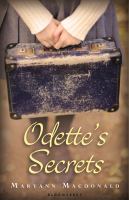
Gr 5-8-This story opens as World War II is beginning and the persecution of Jews in France is escalating. After Paris falls to the Nazis, Odette is rushed to the countryside, where she hides in plain sight by living with a family and pretending to be Christian. There she struggles with her identity. The strength of the novel lies in MacDonald's meticulous research, which is explained in an author's note, of the real Odette Meyers, whose photos are included. The author weaves in facts about Odette's life and the events taking place at the time with imagined scenarios in which Odette may have found herself. However, the author's free-verse prose style makes readers acutely aware that an adult is trying to write from a child's perspective, and it sounds not so much poetic as fragmentary and unorganized. This book is a good introduction for children interested in how the war and the Holocaust affected the everyday lives of kids their age, but in a field with so many classics and reinterpretations of similar stories, such as Judith Kerr's When Hitler Stole Pink Rabbit (Collins, 1971), Lois Lowry's Number the Stars (Houghton, 1989), Jennifer Roy's Yellow Star (Marshall Cavendish, 2006), and Sandi Toksvig's Hitler's Canary (Roaring Brook, 2007), it's an additional purchase.-Anne Barreca, New York Public Library (c) Copyright 2013. Library Journals LLC, a wholly owned subsidiary of Media Source, Inc. No redistribution permitted.
Odette's life in Paris is happy until Jewish shopkeepers' stores start being vandalized and rumors of war become fact. With her father in the army, Odette, her mother, and her beloved godmother are left to manage under the growing restrictions against Jews. Eventually, Odette is sent to the countryside-safer, but not devoid of anti-Semitism-where she spends the rest of the war as a hidden child. When the war ends, Odette, no longer sure how Jewish she feels, is reluctant to return to Paris, memorably described, like the rest of postwar France, as a "gigantic Lost and Found" for Jews seeking missing family members. As Odette starts to understand the extent of the losses her community has suffered, she rediscovers her identity as a Jew. Macdonald used the real Odette's auto- biography as the basis for this book, and her free-verse narrative is charming and effective. Although Odette's age is never given, her youthful perspective and the overall nonspecificity about the war, make the book best suited to readers on the younger end of the target audience. Ages 10-14. Agent: Steven Chudney, the Chudney Agency. (Mar.) (c) Copyright PWxyz, LLC. All rights reserved.
Set in France during WWII, Odette's Secrets is a novelization, in verse, of the life of Odette Meyers, whose autobiography, Doors to Madame Marie (1997) was an inspiration for this book. When life in Paris becomes too dangerous for Jews, including Odette, the young girl is sent to the countryside, where she must disguise herself as a French peasant and Christian, keeping her true identity a closely guarded secret. After many months, Odette's mother, who has worked with the French Resistance, joins her and, like Odette, must lose her own Jewish identity. Two and one-half years later, Paris is liberated, and Odette and her mother return to the city, but can Odette resume her true identity as a Jew or has her assumed Christianity become too much a part of her being? Though sometimes lacking in drama, this quiet story will nevertheless offer readers new insights into considerations of being a Jew during WWII and the complex ways that we define our identity.--Cart, Michael Copyright 2010 Booklist


